TAXRAIDTO HIT HARDEST IN LONDON
EXCLUSIVE JACK BARNETT AND CHARLIE CONCHIE
NEW ANALYSIS suggests that almost a quarter of a million Londoners will be dragged into the higher rate tax band as a result of Jeremy Hunt’s decision to freeze income tax thresholds in the Autumn Statement.
Some 213,165 workers in London, and 122,543 more across the wider south east, will pay the 40 per cent rate as soon as this April as a result of the level at which it kicks in not being uprated with inflation or average pay, per analysis by Investec Wealth and Investment.



Wonks warned the Treasury was at risk of “killing the goose that lays the golden egg” if the capital was squeezed too tightly.
It means that more than a third of Londoners, 36.1 per cent, will be paying the higher rate.
Investec Wealth & Investment’s Faye Church said “workers in London... are taking the biggest hit” from the Treasury’s push to refill the country’s postpandemic coffers.
Hunt also reduced the top rate of tax threshold from £150,000 to £125,140.
Church said “given the number of high earners working in the City, it stands to reason that they will be amongst the hardest hit” by the threshold cut.
Hunt’s move to cut the threshold came just weeks after former Chancellor Kwasi Kwarteng announced plans to scrap the top rate of tax altogether, only to U-turn after political pressure and a market reaction to his wider ‘growth plan’ package.
Last night think tank leaders in the capital said the Treasury’s reliance on London and the south east could be counter-productive.
“The country’s stark over-reliance on









London’s success to balance the books is plain for everyone to see,” Nick Bowes, chief executive of the Centre for London, told City A.M. last night, arguing that plans to ‘level up’ the country could potentially relieve some of the pressure on the capital.

Bowes said the tax changes meant “the country’s economic health is dangerously reliant on the capital firing on all cylinders, but it would be foolish to take for granted that London’s success will just continue into the future regardless.
“If the city sees reduced investment in the infrastructure and public services London needs to thrive, this could kill the goose that lays the golden egg, leaving the whole nation poorer,” he continued.
The average Londoner already pays double the national average in income tax, according to the most recent official figures.
The Treasury has previously said that “we have been honest about the difficult decisions we face and are asking those with more to contribute more”.
RISHI SUNAK is looking at new widespread strike-busting legislation as the UK gets ready for a winter of disruption.
Sunak ratcheted up his rhetoric against union barons yesterday as he told MPs that “I have been working for new tough laws to protect people”, with Number 10 confirming it would go further than just protecting against transport strikes.
Number 10 said “work is ongoing at speed” on the new legislation, with Sunak’s spokesperson refusing to rule
out banning ambulance drivers from striking.
It comes as nurses, rail staff and other key workers are set to go on strike this month as a part of industrial action expected to cause chaos over Christmas.
Yesterday Border Force officials announced they would go on strike at airports including Heathrow over the Christmas period.
Trades Union Congress (TUC) chief Frances O’Grady said “ministers have seemed more interested in sabotaging talks than trying to resolve disputes”.
Reeves warns on investment as Labour prepares to woo Square Mile leaders
EXCLUSIVE STEFAN BOSCIA
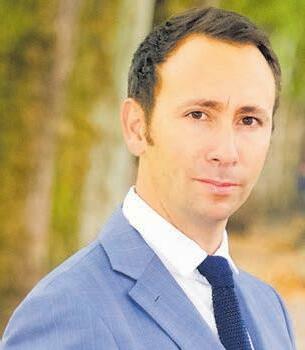
SHADOW CHANCELLOR Rachel

Reeves warned last night that French President Emmanuel Macron is “eating the UK’s lunch” when it comes to attracting global investment in an exclusive interview

with City A.M. Reeves said that France was successfully stealing investment away from British startups post-Brexit, with the shadow chancellor promising to help pension funds unleash billions of pounds of long-term capital into the economy.
Reeves and Sir Keir Starmer will launch Labour’s start-up review in a
Canary Wharf event today, with the party promising a “radical plan to make Britain the high growth, startup hub of the world”.
“Macron is trying in his country’s national interest to get more of the VC money into his country. The US through the US inflation reduction act is trying to get investment
into the green industries of the future in their country,"





Reeves told City A.M. “This is not a static environment –it’s a dynamic one and we have to compete globally for our share of investment.”
The probe was called to address the UK’s stagnating levels of Venture Capital (VC) investment into British start-ups, which review chair Lord Jim O’Neill –a crossbench peer and former Goldman Sachs economist –called “dreadful”.
THURSDAY 8 DECEMBER 2022 ISSUE 3,905 CITYAM.COM FREE INSIDE FCA DRAWS CRYPTO DIVIDING LINE P3 FARMERS BACK SOLAR U-TURN P6 ITV TAKES ON THE STREAMERS P10 BIG BANG 2.0 MORE OF A WHIMPER P14 SPORT P22 LONDON’S BUSINESS NEWSPAPER SARNIE BARNIE THE CHRISTMAS SANDWICHES –REVIEWED P21
£ CONTINUED ON PAGE 2
STEFAN BOSCIA
QUARTER OF A MILLION DRAGGED INTO HIGHER RATE
THE STRIKE BUSTER
IN THE KNOW OUR STAR COLUMNIST GETS THE CITY TALKING
ALMOST
SUNAK
Prime Minister promises powers KLEIN-MAN
P13
STANDING UP FOR THE CITY
London cannot afford complacency with new competitors around
THE PERILS of business journalism are many but one that is often underremarked upon is the danger of drowning in data releases. Inboxes our end are full of new analyses, some of relatively questionable value, and it is sometimes hard to see the wood from the trees.

Not so yesterday when the latest iteration of the IMD World Talent Ranking turned up. Developed by the World Competitiveness
THE CITY VIEW
Centre, this ranking pools the thinking of around 5,000 global execs on everything from salaries to the quality of life and to a certain extent gets at one simple question: where in the world might one find the most talented workforce. It measures three
prongs: the investment and development of a homegrown workforce, the appeal that a city or a country has to foreign and local talent, both in attracting it in the first place and retaining it, and the readiness factor –that is, how skilled an existing workforce is and its ability to create jobs for newcomers.
The UK, rather concerningly, is on the slide. Scandis and the Swiss, by all accounts, knock us into a cocked hat –the UK sits at 28th of
63 countries surveyed. That seems, to us, rather low, and is certainly cause for concern. Too many bright people are considering careers outside of the capital –and we are competing with not just Paris or (God forbid) Frankfurt, but New York, Singapore, Zurich and a host of other upwardly mobile cities. On our laurels we cannot rest. One of the reasons that the UK has slipped is our brief flirtation with banana republic politics; two
others, far more worrying, are our reputation as a home to foreign talent post-Brexit and our insane housing market. Central government has made little progress on either, and more is also required from our local leaders, too.
With growth in the doldrums and more competition emerging, this is no time for complacency about our ability to retain and attract the world’s very smartest young talent.
THE FINANCIAL TIMES
FIRST UK COAL MINE IN 30 YEARS GETS GOVERNMENT GO AHEAD
The first coal mine in Britain for 30 years has been given the go-ahead by the government, prompting a storm of protest from green groups and MPs across the political spectrum.
APPLE PLANS NEW ENCRYPTION SYSTEM
Apple is planning to significantly expand its data-encryption practices, a step that is likely to create tensions with governments around the world as the company continues to build new privacy protections for iPhone users.
THE TELEGRAPH HOMEOWNERS ALLOWED TO GO ‘INTEREST-ONLY’ AS REGULATOR RELAXES RULES
Homeowners struggling to pay their mortgage bills will be able to switch to interest-only deals without a formal repayment plan under new plans to help borrowers with the cost of living crisis.
Labour’s City offensive continues with Mayor promising party is ‘on your side’
Business Bank (BBB) to act as a conduit between VCs and British start-ups.
THE UK attracted around $15bn of VC funding in 2020, compared to $144bn in the US and $44.6bn in China.
London is also falling further behind New York in attracting new initial public offerings (IPOs), with many London start-ups now listing overseas.
The review will include calls to imitate France’s Tibi technology financing scheme, which sees its public investment bank help facilitate capital flows, and to promote start-ups incubated in British universities.
This would include using the British
Reeves said the best way for the City to ensure more British firms list in London was to ensure they can access long-term capital funding while they are growing.
“What start-ups are saying to us is the problem is the lack of the longterm patient capital in London and in the UK, which is encouraging them to look elsewhere,” she said.
“If you find your investors elsewhere, you end up listing elsewhere.”
Mayor of London Sadiq Khan will also speak at Labour’s business confer-
ence, which is being sponsored by HSBC and Mastercard, and will tell City bosses he is “on your side, not in your way”.
“Good governments lay the foundations for businesses to thrive, so our people can too,” he will say, in extracts of the speech seen by City A.M.
The sold-out Labour business event today will be attended by a host of City bigwigs, including Tesco chair John Allan. Former Sainsbury’s boss Justin King and Amanda Blanc, the chief executive of insurance giant and City A.M. insurer of the year Aviva, are also widely reported to be attending.
Wall Street lenders shed staff as slowdown bears its teeth
JACK BARNETT
WALL Street banks are laying off workers to offset the damage inflicted on their finances by a slowing global economy.
US lender Morgan Stanley earlier this week became the latest firm to announce more redundancies, shedding two per cent, or around 1,600, of its workforce.
Goldman Sachs earlier this year also slashed staff and its chief executive, David Solomon, warned on Tuesday the investment banking titan will need to be more
“cautious” with its finances going forward in a likely nod to more job cuts.

European bank Credit Suisse in its latest results said it is ditching 9,000 workers, although that decision was driven by attempting to turn around years of underperformance.
Deal making, which has been a key source of revenue for investment banks over the past decade, has slumped due to firms exercising greater caution as economic storm clouds gather.
UK banks have yet to follow the redundancy drive.
CITYAM.COM 02 THURSDAY 8 DECEMBER 2022 NEWS
THE WALL STREET JOURNAL
CONTINUED FROM PAGE 1
WHAT THE OTHER PAPERS SAY THIS MORNING
UKRAINE An aerial photograph taken yesterday shows the extent of the Kremlin’s aggression, as an official examines the remnants of missiles used to attack Kharkiv
FCA set to draw crypto dividing lines after FTX
CHARLIE CONCHIE
THE UK’s financial watchdog yesterday said it will ensure crypto firms have “sterile corridors” between the different products and services they offer, as it assesses the wreckage of collapse crypto exchange FTX and prepares to bring the sector into its remit.
Speaking to MPs at a select committee hearing yesterday, Financial Conduct Authority (FCA) officials said the regulator had taken “learnings” from the collapse of Sam Bankman-Fried’s empire and would ensure that crypto products and services do not cross-contaminate when it has powers to regulate the sector.
“If you take a step back from FTX, what you’ve got is [a firm] minting a coin and then issuing it… then you’ve got trading of it in the same place, you’ve then got wholesale market activity, and you’ve got custody,” the
FCA’s director of payments and digital assets, Matthew Long, told MPs.
“In our view, extremely dangerous, because you can have an interaction between each of those things.”
He added that in other “regulated areas” there would be separate entities that would have “sterile corridors so they couldn’t effectively influence each other”.
“There is a piece here where minting your own coin and then being able to offer it and trade it in the same place, and then have a cyclical process, is a risk for us both in the UK and internationally,” he added.
The FCA currently has minimal oversight of crypto firms but is due to gain greater powers as a result of an amendment to the Financial Services and Markets Bill currently passing through parliament. Ministers have already drawn up plans for crypto rules, the Financial Times reported this week.
TRADING DOWN Moonpig says customers picking cheaper gifts amid cost crunch



JOBS MARKET SLOWS

The UK jobs market is looking increasingly fragile after months of defying economic gravity, a new survey out today reveals.

KPMG and the Recruitment and Employment Confederation’s (REC) permanent hiring index came in at 46.4 points last month, below the 50 point mark that separates growth and contraction.

Despite the index indicating businesses are cooling off from taking on staff, it did jump from 45 points in October, which experts said signalled unemployment may not rise sharply.
Neil Carberry, chief executive of the REC, said: “This month’s data emphasises that while employers are moderately more cautious in the face of economic uncertainty, this is not yet a major slowdown in hiring.”
HOME REIT SUIT


UK house prices fall in sharpest plunge since 2008 financial crisis
MILLIE TURNER
HOUSE price growth has continued to cool in the UK, with last month representing the sharpest decline in value since 2008.
The average cost of a home now stands at £285,579, after falling by 2.3 per cent in November, according to Halifax yesterday, which began
tracking house prices in 1983.
Growth rates have slowed considerably in the past few months, in response to higher mortgage rates and the cost of living crunch in the country.
While prospective buyers may be rubbing their hands together, estate agents in London have noticed the rate of sales and appraisals is slowing.
Beleaguered property investor Home REIT was hit by a lawsuit from investors yesterday amid claims it is “profiteering from the housing crisis” and used misleading information to raise cash.
The social housing-focused firm has been hammered by a slew of claims from short sellers in the past two weeks over the quality of charity tenants in its portfolio and the accuracy of accounting information it has provided to its backers.
Specialist commercial litigation firm Harcus Parker has now launched a claim against the firm to seek redress and recoup investors’ cash.
03 THURSDAY 8 DECEMBER 2022 NEWS CITYAM.COM
Moonpig CEO Nickyl Raithatha told City A.M. ongoing disruption from Royal Mail strike days was “clearly not helpful” to the greetings cards business, as customers expected deliveries on specific days.
IN BRIEF
UAE telcos giant Emirates raises Vodafone stake
 LEAH MONTEBELLO
LEAH MONTEBELLO
EMIRATES Telecommunications Group upped its stake in Vodafone to 11 per cent yesterday, but dismissed that it would make any grand swoop for the British telecoms firm.
The firm, which is Vodafone’s biggest shareholder, raised its stake by one per cent, stating that the rationale for investment was “unchanged” from the original plan, which is to “gain significant exposure to a world leader in connectivity and digital service at an attractive valuation”.

It comes after Vodafone chief exec Nick Read announced on Monday that he would exit the company at the end of December as its share price continues to plunge and investors are left increasingly disgruntled.
After four years at the top spot, Read steered the telecoms giant through the Covid-19 pandemic, narrowing the company’s focus on Europe and Africa, and cutting costs.
Telecoms analyst at PP Foresight Paolo Pescatore told City A.M. the timing of Emirates’ move was likely a coincidence
than a calculated strategy.
“The UAE provider is keen to expand beyond its core market. Vodafone’s global and particularly European operations offer plentiful opportunities for both Etisalat and Vodafone to work more closely to bring greater efficiencies and launch new products globally," he said.
Vodafone’s share price has fallen more than 60 per cent over the past five years, and has plunged by about a fifth this year alone compared
Quiz swings to profit as it heads into Christmas party dress season
EMILY HAWKINS
FASHION retailer Quiz has continued to bounce back after struggling during the pandemic, swinging back into the black in the first half of the year.
The retailer – which operates 62 stores in the UK and an ecommerce platform – posted a £1.8m profit before tax for the six

months to 30 September.
It comes after the retailer suffered a loss of £1.3m in the year before.
The Scottish-founded firm said its near-term outlook was “difficult to predict”, like many UK retailers, due to the cost of living crisis and cost inflation pressures.
However, bosses continued to expect a full-year outcome that would “be at least in line with









market expectations”, ahead of its crucial Christmas trading and January sales periods.



Quiz will be waiting to see whether the cost of living crisis stops shoppers from buying Christmas party dresses. The crisis would “undoubtedly” impact Quiz but it will likely be protected by competitive prices, Sarah Riding from law firm Gowling WLG said.
with a two per cent gain in the FTSE 100.
In recent months, Read has shifted the telecom giant’s focus onto mergers and acquisitions, recently agreeing a co-control deal for its towers business and continuing merger discussions with Three UK.
However, the company’s weak performance in its largest market Germany and lacklustre appetite for deals in Spain, Italy and Portugal all spelled danger for Read.
All Bar One owner Mitchells & Butlers laments energy bill anxiety
EMILY HAWKINS

MITCHELLS & Butlers (M&B) yesterday said that “significant uncertainty” remains over the heftiness of its energy bill next year, as pub bosses call for more financial aid.
The All Bar One and Toby Carvery owner said its trading environment “remains very challenging”, with cost inflation headwinds expected to be as much as 12 per cent for the current year.
M&B said its energy costs were set to soar further and it had brought forward 45 per cent of this financial year’s anticipated energy requirement.
Shares in the pub operator shot up over six per cent yesterday after M&B announced was back in the black after recovering from the side effects of the Covid-19 pandemic.
Pub bosses have urged the government to set out details of what support will be available beyond the current scheme, which ends in April.

05 THURSDAY 8 DECEMBER 2022 NEWS CITYAM.COM
The pub operator made a return to profit in its full-year results yesterday
Vodafone’s share price has plummeted 60 per cent over five years
Renewable levies hurt green goals, Siemens warns
EXCLUSIVE NICHOLAS
EARL
THE UK’s planning restrictions and levies on renewable energy producers undermine what should be an attractive market for renewable generation and green technology, a senior member of technology specialist Siemens Energy has warned.
Steve Scrimshaw, vice president of Siemens Energy UK & Ireland, told City A.M. that the government should not “scare the horses” by making future projects less financially appealing to investors than they should be.
The energy boss recognised the costof-living crisis, reflected in record household energy bills, meant developers and producers expected a “certain degree” of intervention in the market.
However, Scrimshaw believed the government needed to ensure raising revenues from domestic energy generation for necessary support packages did not hamper spending commit-
ments for a greener future.
Scrimshaw said: “You have circumstances with the current energy crisis which have required intervention. I think people will accept a certain degree of that type of thing to help with the current crisis, but we have got to be careful and cautious so that we don’t scare the horses.”
Scrimshaw also described current planning rules for projects as “hurdles” for investment.
He said: “I understand they need to look after consumers and that’s important, but I think they also need to take the brakes off to allow developments to happen quickly.”
The government is targeting a vast ramp up of offshore wind, hydrogen and solar to boost the country’s supply security following Russia’s invasion of Ukraine in February earlier this year.
The UK is also a signatory of the Paris Agreement and is aiming to reach net zero carbon emissions over the next three decades.
Here comes the sun: Farmers back U-turn
offer a good diversification option for farmers.”

THE UK’s leading agricultural body has backed the government’s decision not to expand restrictions on farmland solar panels to moderate quality land.

Tom Bradshaw, deputy president of the National Farmers Union (NFU), told City A.M: “Renewable energy production is a core part of the NFU’s net zero plan and solar projects often
He also recognised the need to “strike a balance between food security and climate ambitions”.
Bradshaw’s comments follow the latest U-turn from Downing Street, after environment secretary Therese Coffey confirmed panels on farmland will not face further restrictions.
She told the Environment, Food and Rural Affairs Committee earlier this
week that ‘3b land’, which was capable of producing cereals and grass, could be used for solar farms.
There were concerns within the industry that the government would back plans from former environment secretary Ranil Jayawardena to impose restrictions on building renewable projects on ‘3b land’ to boost domestic food security. This would mean 60 per cent of farmland would be unavailable for green projects.
‘They had their chance’: Octopus boss slams rivals in Bulb battle
NICHOLAS EARL
THE BOSS of Octopus Energy has hit back at rival firms challenging its takeover of Bulb, amid a protracted legal battle over the fallen supplier’s future.
Chief executive Greg Jackson told City A.M. that other suppliers should have made a bid for Bulb, rather than challenging the deal in the courtroom.
He said: “They had their chance, and walked away. They can’t compete on service or value so are resorting to
the courts, increasing costs and uncertainty for taxpayers.”
Octopus is inching towards finalising its takeover of Bulb, after a court approved the transfer of its 1.6m customers by 20 December earlier this month.

However, British Gas owner Centrica, E.ON and Scottish Power have sustained their legal challenge and are now pursuing a judicial review of the acquisition.
The three energy firms have argued there has not been enough time to assess the terms of the deal before it
goes through, and have also criticised the lack of transparency around the takeover – particularly concerning the amount of taxpayer funding involved.
If the judicial review is successful, then Octopus’ deal for Bulb could still be scrapped, potentially reopening the bidding process while leaving the supplier in special administration.


This is expected to
run separately to Octopus’ takeover, as City A.M. understands the judicial review process is likely to run into at least the first few months of next year –potentially as late as Easter.
The primary concern of rival suppliers has been the extent of government support involved in the takeover, with the rival firms suggesting this was not made clear as an option during
the bidding process.
Both sides are set to file documents to the court today, suggesting a timeline for the judicial review process, which will then be determined by the judge over the following days.
There is growing uncertainty over the costs involved in propping up Bulb on life-support for over a year, with the Office for Budget Responsibility estimating last month that the costs have spiked to an eye-watering £6.5bn. This would make it the biggest state bailout since RBS in 2008.

CITYAM.COM 06 THURSDAY 8 DECEMBER 2022 NEWS
The NFU said solar projects offer a good diversification option for farmers but a balance must be struck with food security concerns
NICHOLAS EARL
Octopus Energy CEO Greg Jackson

London comes out on top of tech IPO slump
LEAH MONTEBELLO
THE EUROPEAN tech industry has lost more than $400bn (£327bn) in value as dealmaking ground to a halt this year amid ongoing economic uncertainty.

According to a report by London-based Atomico, tech startups across Europe are on track to raise $85bn ((£70bn) in funding this year, down $15bn on 2021 levels.
The report said the industry was now valued at $2.7 trillion as the region grapples with war in Ukraine and inflationary pressures.
The number of unicorns in the continent also slumped to 31 this year, the lowest level since 2017, and down from the over 100 that were created last year as initial public offerings (IPOs) flourished. Unicorns are tech start-ups valued at more than $1bn (£818m).
Despite the downturn this year, the UK still came out on top, with London
remaining the most attractive European hub for capital, with $19.2bn of financing. This was followed by Paris, which hit $9.9bn this year.
Founder of Tech London Advocates & Global Tech Advocates Russ Shaw said the report showed how tech was “still punching above its weight”.
“There’s been a relative ‘cooling-off’ with megarounds and inflated valuations –but the resilience and maturity of the European tech ecosystem prevails,” he explained.
Chief executive officer of the Stratford-based innovation campus Here East Gavin Poole said the findings from Atomico were a “testament to the excellence of the European tech sector and the job creation it is responsible for”.
He also pushed back against direct comparisons to 2021 for investment figures, calling last year a “class of its own”.
Airlines call on EU to include long-haul flights in CO2 scheme
ILARIA GRASSO MACOLA
AIRLINES such as Ryanair and Easyjet yesterday called on the EU Commission to include long-haul flights within its environmental regulation.
The comments come on the heels of the Commission announcing that intra-EU airlines will pay for their CO2 emissions starting next year.
Under the current legislative framework, airlines that operate intraEuropean flights have to submit permits to the bloc’s carbon market to cover their emissions. Usually handed out for free, these permits are not needed by those operating longhaul flights.
The European Commission was approached for comment.
Green fuels for aviation ready for takeoff
ILARIA GRASSO MACOLA
THE PRODUCTION of sustainable aviation fuels (SAFs) is set to increase 200 per cent by the end of the year. Estimates from the International Air Transport Association (IATA) forecast that green aviation fuel production could reach between 300m and 450m litres, up from the 100m litres produced last year.
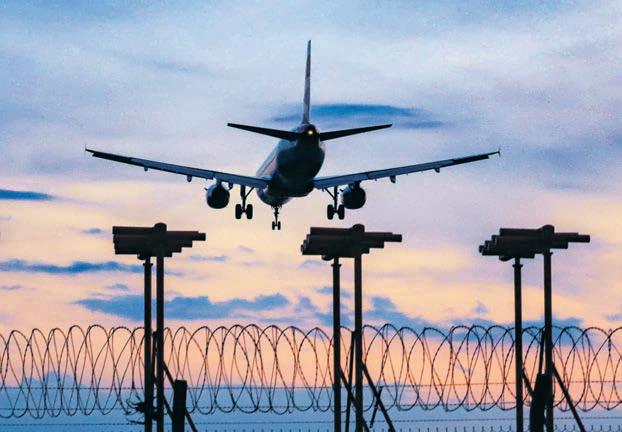
A byproduct of solid waste and food scraps, SAFs reduce emission by 80 per cent over their life cycle.
They are considered the main tool aviation has to become net-zero by 2050 as the development and adoption of greener alternatives such as hydrogen or electric planes remain a few decades away.
While the industry is still lagging behind –with forecasts estimating around 45bn litres will be required annually for aviation to decarbonise –demand proves robust.
“There was at least triple the amount of SAF in the market in 2022 than in 2021,” said IATA’s director general Willie Walsh. “And airlines used every drop, even at very high prices! If more was available, it would have been purchased.”
Permits will be phased out gradually over the next four years, with just a few still free
CITYAM.COM 08 THURSDAY 8 DECEMBER 2022 NEWS
Stagecoach up as commuters swap car for bus
 MILLIE TURNER
MILLIE TURNER
STAGECOACH’s revenue has jumped by nearly £100m, but profits have taken a hit due to soaring fuel costs, the company announced in interims yesterday.

The bus operator pocketed nearly £670m in the six months to the end of October, up from around £580m in the same period a year ago.
However, operating and pre-tax profits have taken a hit, dropping to £33m and £24m respectively as inflation washes over businesses.
Despite rising costs, recent passenger journeys were at around 80 per cent of 2019 levels.
The bus operator struggled during the pandemic, as Brits were more likely to take the car than bus to social distance.
But with the cost of living crisis weighing considerably on household budgets, demand has returned as commuters opt for public transport to avoid spending money on fuel.
“We have made further progress as we rebuild from the pandemic, manage the immediate-term macroeconomic headwinds, and position our business to maximise the opportunities for growth as we transition to a net zero future,” boss Martin Griffiths said in a statement yesterday. “At the same time, the current economic environment is helping to demonstrate the good value of our public transport services and encourage modal shift away from the car.”
It comes after Stagecoach was taken private by German asset manager DWS in a £594m deal in March.
Tube trips in shopping hotspots overtake pre-pandemic levels
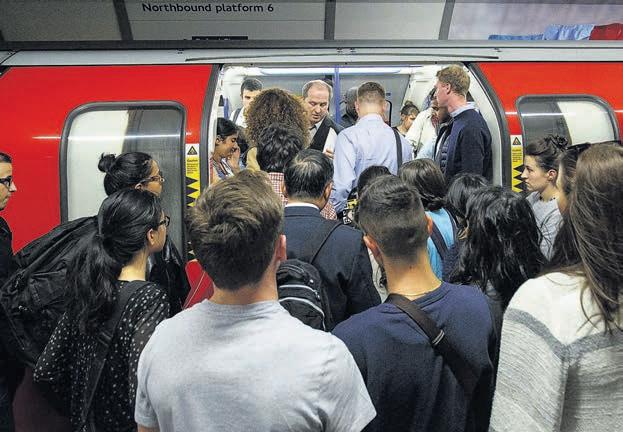 ILARIA GRASSO MACOLA
ILARIA GRASSO MACOLA
TRIPS on the tube to key shopping centres have reached pre-pandemic levels, as the Elizabeth Line and Christmas rush boosts retail.
Figures published yesterday by Transport for London showed Tottenham Court Road and Bond Street have exceeded pre-pandemic
passenger numbers following the opening of the Elizabeth line.
The data was welcomed by London businesses amid the lucrative run-up to Christmas trading period.
London Business Alliance boss Ros Morgan said making the West End “more accessible” and “more enjoyable to get around” would help boost footfall and support businesses.
Mitie and PAE provisionally cleared by CMA
JACK MENDEL
THE MARKETS regulator has closed an investigation into alleged anticompetitive behaviour over procurement contracts for Heathrow and an immigration centre.
In an update published yesterday, the Competitions and Markets Authority (CMA) said it would close the probe into the conduct of Mitie and PAE launched in March.

The two firms were responsible for on-going procurement run by the government for contracts to supply services as Heathrow and Derwentside Immigration Removal Centres.
The probe was launched after the CMA received information which led it to believe the parties had infringed on competition law when they withdrew from both contracts.
This comes amid controversy over the Home Office’s handling of detention centres, with an estimated 40,000 migrants crossing the channel in November.
The CMA said it had “provisionally decided to close the Investigation on the basis that there are no grounds for action”.
09 THURSDAY 8 DECEMBER 2022 NEWS CITYAM.COM
Weekend ridership levels on tubes are now edging towards pre-pandemic levels
‘Shameful’ firms fined for unlawful marketing calls to the over 60s
TED HENNESSEY
FIVE “shameful” firms have been fined a total of £435,000 for targeting people over 60 with nearly half a million unlawful marketing calls.
The firms were “deliberately targeting” those signed up with the Telephone Preference Service (TPS) – a register for those who do not want to receive marketing calls – to sell insurance for washing machines, kitchen appliances or boiler cover.
It is against the law to make a live marketing call to anyone who is registered with the TPS, unless they have told the specific organisation they do not object to receiving calls from them.
Homeowners over 60 with a landline were targeted by the firms, who used
pressure tactics with a view to getting payment details, the Information Commissioner’s Office (ICO) said.
The ICO investigated and fined the firms – Allapplianceservices, Boiler Cover Breakdown, Boiler Breakdown , Repair Plans UK and Utility Guard – as much as £140,000.
Andy Curry, head of ICO investigations, said the tactics were “completely unacceptable”.
“To be made to feel as though you have to hand over your bank details simply to get someone off the phone is nothing short of shameful, and that is why we have taken action against these companies,” Curry added.
The ICO has issued more than £2m in penalties against rogue companies responsible for nuisance calls, texts and emails in 2022.
City of London update

Speak for the City and shape its future
CITY of London elections are your way to help shape the future of the Square Mile.
Unlike elsewhere, both workers and residents can vote and you must reconfirm your registration each year. If you are a City worker, you can request a vote at your organisation at www.speakforthecity.com
Voter registration forms must be received by 16th December. If you would like to receive this by email or have any questions, please contact electoralservices@cityoflondon.gov.uk
While the next election for all Common
Councillors will not be held until 2025, elections for Aldermen and by-elections may be held at any time.
If you are passionate about the City and are interested in standing for election in the future, please find out more at www.speakforthecity.com/ stand

Fes tive events at Leadenhall
CELEBRATE the festive season with Leadenhall Market’s Christmas workshops and guided walks.

Throughout December there will be a series of Christmas workshops – from beautiful crafts and wreathmaking with Floral Merchant London to ‘A taste of Leadenhall’ winetasting – with a mix of guest traders and Leadenhall Market’s talented tenants hosting the sessions.
And every Wednesday until 21 December the much loved guided walks
will take on a festive flavour with tales of a Leadenhall Christmas past and present (6.30pm – 8pm).
www.leadenhallmarket.co.uk/ whats-on
News, info and of fer s at www.cityof london.gov.uk/eshot
BBC calls for more funds to battle
Netflix
LEAH MONTEBELLO
THE BBC has called for “serious public service investment” if it is to stand a chance against the likes of Netflix and Disney Plus.
BBC director-general Tim Davie said yesterday that the broadcaster needs more money to “avoid further cuts” and to survive what he called a “period of real jeopardy” for the media landscape.
The licence fee was frozen at the start of this year at £159 for the next two years, and means the Beeb faces a £400m funding gap by 2026/27. Davie said the freeze means that the BBC plans to have “fewer brands overall”.
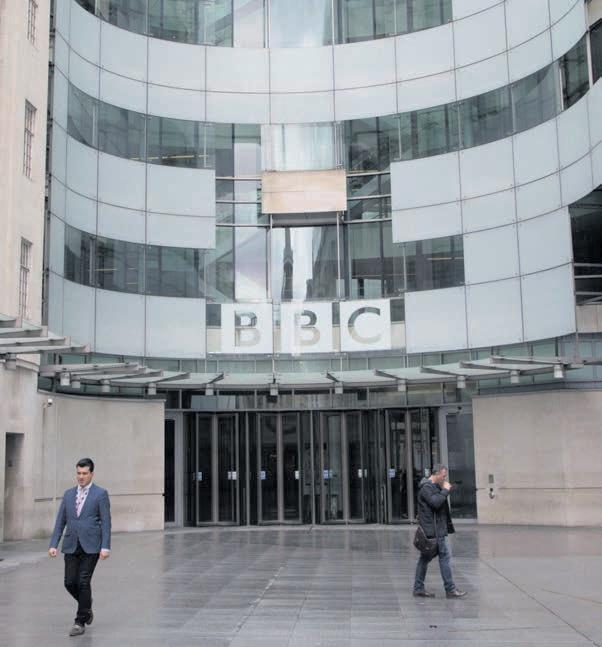
Davie’s comments come after culture secretary Michelle Donelan said this week that it would be “impossible” to sustain the BBC on the current licence model and that she would be evaluating alternative models.
ITVX launch: Streaming service hopes to win back Gen Z’s attention
ITVX has officially launched today, replacing the broadcaster’s clunky Hub and welcoming a flurry of new viewers –or so ITV hopes.
The man behind this fresh new streaming platform is ITV’s managing director Rufus Radcliffe, who has made it his task to attract youngsters and advertisers alike.

The platform rebrand was first announced back in March off the back of a stellar set of results, which it hoped would revitalise the company’s dwindling share price.
Although the announcement instead sent shares tumbling as much as 25 per cent in one day, Radcliffe told City A.M. that ITV was ahead of the curve in a lot of ways –with Netflix and Disney both separately launching their own cheaper ad offers since.
As it stands, ITVX is a free, ad-supported service, upping content from 5,000 to 15,000 hours, boasting both exclusive content and ITV favourites such as Love Island and Coronation Street.
It also has a subscription option, which removes ads and bundles in Britbox for £5.99 a month.
Radcliffe said he expects about 90 per cent of viewers to watch for free, backing the ad landscape to keep spending in 2023.
“The really big focus for us is it’s a free service, which I think works in the cost of living crisis,” he explained.
A key goal for the broadcaster is also about targeting what it calls “mainstreamers”, which Radcliffe defines as a Gen Z viewer that consumes the ma-
jority of their video diet via streaming platforms such as Netflix, but may default to watching ITV to get the World Cup or I’m A Celebrity, for instance.
The idea is that once it can get more viewers on the platform, it can keep hold of them with a wider library that “brands would bite your arm off to have,” Radcliffe says.
However, TV expert at research hub Enders Analysis Tom Harrington underplayed the ITVX buzz.
“ITV is just accepting that it needs to get into the future,” he told City A.M., explaining the firm’s reluctance to evolve in recent years, especially when
compared to Channel 4 and the BBC.
Indeed, although ITV says it wants digital monthly users to hit 20m in the next three years, this pales in comparison to BBC iPlayer’s current 10.7m a week.
He also warned that because online content was harder to monetise than linear TV, the transition may not be the big win investors are hoping for.
Harrington expressed doubts about whether ITV had enough resources to keep up with the US streaming giants in terms of content that would actually keep youngsters engaged enough to cash in with advertisers.
CITYAM.COM 10 THURSDAY 8 DECEMBER 2022 NEWS
LEAH MONTEBELLO
BBC top dog Tim Davie said the broadcaster needs more cash to avoid cuts
ITVX, which offers shows like Love Island, has been in the works for over 18 months
PA


Please donate £25 this Christmas to give a young person a hot meal and a safe place to sleep Visit: centrepoint.org.uk/sarah Scan with your smartphone camera Or call: 0800 473 01 84 Will this C Christmas *Based on a survey of 215 young people supported by Centrepoint and its partners, across England and Wales, in September 2022. limited by guarantee registered in England and Wales under number 01929421. ? 3 out of 4 vulnerable young people worry they exhausted and full of fear for their future. safety and support they so desperately need? RQ1A
GSK and Sanofi shares jump as 50,000 Zantac claims dismissed
MILLIE TURNER
SHARES in Glaxosmithkline (GSK) and Sanofi jumped yesterday, after thousands of claims were dismissed as part of the ongoing Zantac lawsuit.
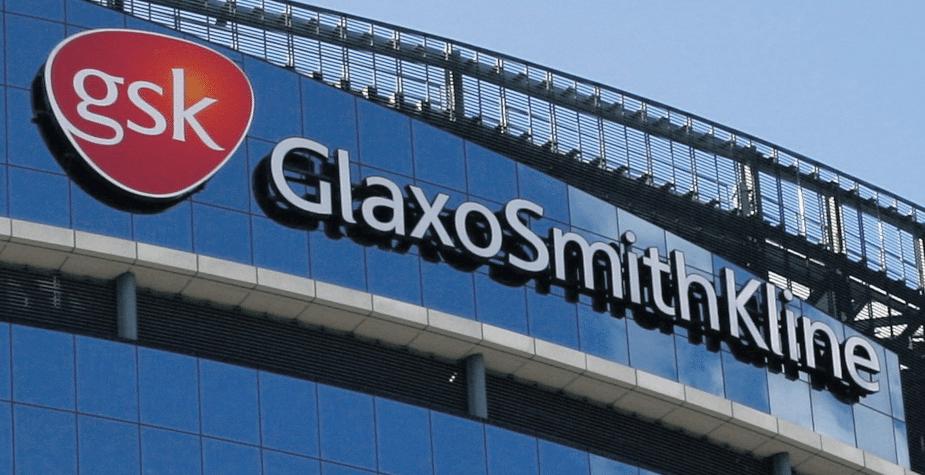
Investors’ fears were soothed late on Tuesday when US district judge Robin Rosenberg rejected 50,000 claims in federal court for not being scientifically grounded.
GSK’s shares jumped around eight per cent to 1,498.00p per share in London yesterday, while Sanofi’s stock price jumped by 5.5 per cent to 90.06 cents apiece in Paris.
The ruling, in Florida, acts as a “nice early Christmas present for the
defendants. Was this all just a storm in a tea-cup after all?,” Bernstein analysts wrote in an investor note.
The British pharmaceutical giant, along with Sanofi and Pfizer, still faces a string of lawsuits elsewhere in the US.
Investor uncertainty surrounding the litigation had wiped almost $40bn (£32.8m) off the combined market value of GSK, Sanofi, Pfizer and Haleon over roughly a week in August.
Haleon, which recently split from GSK, was thrown into the crossfire by association, but has maintained distance from the litigation throughout the saga.
It comes after heartburn drug
Zantac was recalled in 2019, following claims by the US Food and Drug Administration (FDA) that it produced unacceptable levels of cancer-causing chemicals when exposed to heat.
The dismissal of the Floridian cases means that, so far, GSK and Sanofi have avoided what could have potentially been tens of billions worth of damage liabilities.
Jefferies analysts estimated, however, that the litigation could cost GSK $17bn (£14bn) and Sanofi $8bn.
In a statement yesterday, GSK said the “ruling reflects the state of that science and ensured that unreliable and litigation-driven science did not enter the federal courtroom”.
Loosening China Covid laws no silver bullet
MILLIE TURNER AND JACK BARNETT
THE LOOSENING of strict Covid-19 restrictions in China is unlikely to be the silver bullet the local economy needs, according to banking giant ING.

China announced yesterday that it was further relaxing its pandemic measures, meaning only those working in high-risk positions and located in elderly homes, hospitals, child care and primary schools will need proof of a negative test before going to their workplace.

Other institutions can determine their own specific Covid-19 measures, while
positive patients with less severe symptoms can quarantine at home instead of staying in isolation facilities.
It brings some much-needed brighter news to Chinese citizens, after widespread protests erupted last week in response to tough laws around Covid-19 and successive lockdowns.
However, the country has backtracked on so-called ‘reopening’ pledges in the past.
In a research note yesterday, chief economist at ING, Iris Pang, said the bank was not “overly optimistic” about the country’s growth prospects, after the
controversial ‘zero-Covid’ stance stamped out economic activity.


“Moving from isolation facility quarantine to home quarantine will not increase retail sales significantly,” she wrote. However, Pang noted that the use of fewer Covid-19 tests will help trim down the fiscal deficit the government is facing.
“Consumption should recover in 2023 but there might not be any big jump as wage growth in the manufacturing sector could be sluggish given the risk of recession in the US and Europe in the first half of next year,” added Pang.
“In short, economic growth in December and January will not be overly impressive, though we expect a quarteron-quarter improvement in GDP from -0.4 per cent year-on-year in the fourth quarter of this year to 3.4 per cent YoY in the first quarter of 2023.”
Beijing’s strict adherence to tough Covid-19 prevention measures has hobbled the Chinese economy, fresh figures out yesterday revealed.
Exports from the world’s second largest economy dropped 8.7 per cent over the year to November, a much deeper fall than analysts were expecting and
dwarfing the country’s 0.3 per cent decline in October.
Key trade hubs and factories in China have been forced to railroad production suddenly due to Chinese lawmakers launching snap lockdowns to tame virus outbreaks.
That has cut the volume of goods and services and weighed on exports. Weaker demand from western consumers due to their real incomes being knocked by roaring inflation has also dragged down exports.
Onlookers expect India to reap the rewards of China’s stagnant growth.
Bargaining chips: UK and Japan join forces on semiconductors
MILLIE TURNER
THE UK and Japan have pledged to improve their semiconductor supply chains, as part of a freshly inked partnership between the nations.
In a statement yesterday, the UK government said the partnership –which will oversee a combined IT sector worth more than £406bn – will further cement foundations for trade and investment between both states.
Dr Simon Thomas, CEO of British semiconductor firm Paragraf, told City A.M. that by combining efforts on
chips, the UK and Japan could become a dual leader in the industry.
“Barring further conflict that changes the world order and disrupts existing supply chains, Europe, Japan and the UK are too far behind to compete in today’s mainstream semiconductor race,” Thomas said.
“If we cooperate with Japan on future technologies then the
pedigree of both nations could be brought to define a new generation of semiconductors that could definitely lead the world.”
supply chains across like-minded countries in other regions.
£406bn
The partnership is the latest example of so-called “friend-shoring”, where countries spread the risk to their
While Taiwan would seem like the likely contender for a semiconductor supply chain partnership in the AsiaPacific region, Carl-Johan Carlstedt, analyst at security intelligence firm Dragonfly, said that longstanding concerns around Taiwan and where it is placed geopolitically has induced a shift away from the island – where semiconductor manufacturing is the central pillar to its entire economy.
Although an invasion of Taiwan by China is unlikely, with countries
increasingly looking to shore up their supply of semiconductors, “Taiwan is a bit of weakness,” Carlstedt said.

“Japan’s got a history of being one of the big semiconductor producers, going back several decades. That’s obviously drawn down in recent years but it’s got the capacity to do it,” he added.
“Putting all your eggs in one basket is not the clever thing to do when it comes to semiconductors” from both a national security and manufacturing standpoint,” Carlstedt said.
CITYAM.COM 12 THURSDAY 8 DECEMBER 2022 NEWS
GSK shares were up over eight per cent yesterday after the news
The deal will oversee a combined IT sector worth more than
TRADING FACES
Celebs hit the phones for ICAP charity frenzy

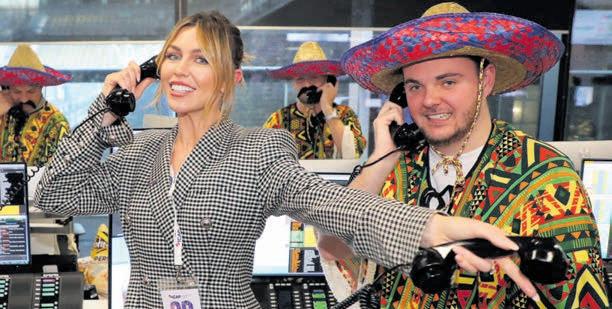
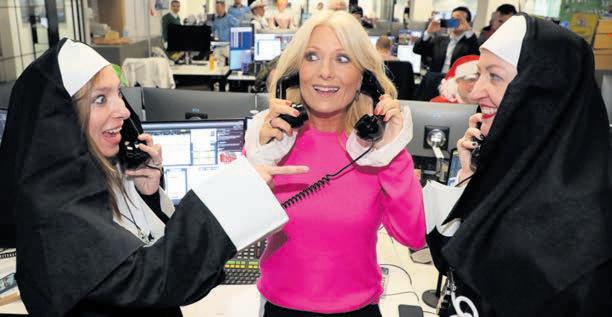 CHARLIE CONCHIE
CHARLIE CONCHIE
ANT AND DEC swapped the jungle for the trading floor yesterday as they hit the phones for London broker ICAP’s charity day.
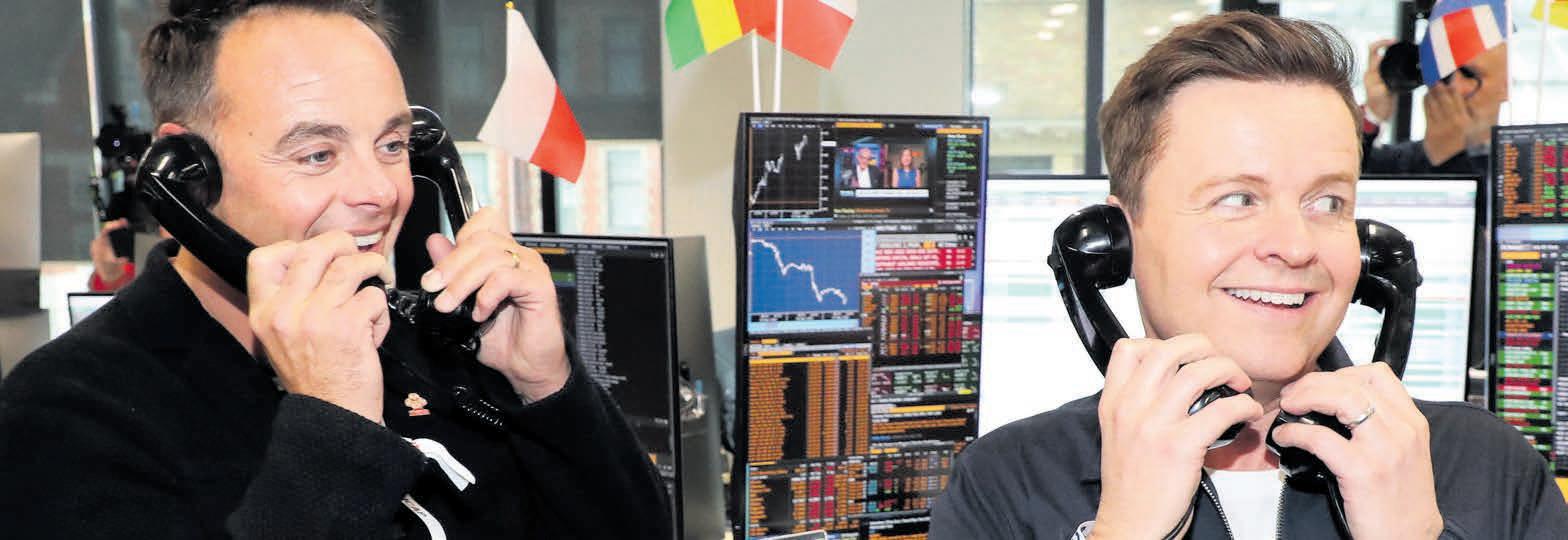
The City firm, which was hosting its 30th annual fundraiser, welcomed names from across the worlds of TV, film and fashion and had them take to the floor to strike trades for good causes.
All revenues and brokers’ commissions on the day are funnelled into charities around the world, with the yearly frenzy raising more than £155m since its foundation in 1993.


The ‘I’m a Celebrity’ duo –raising cash for the Prince’s Trust –were among a host of famous faces to try their hand, including TV presenter Holly Willoughby and film star Will Poulter.

Executive managing director of rates at ICAP, Will Ferguson, told reporters “most of the volumes... going through the market” head to ICAP on charity day.


13 THURSDAY 8 DECEMBER 2022 NEWS CITYAM.COM
Straight out of the Aussie jungle, Ant and Dec take part in global charity day at operator HQ
Nun other than Gaby Roslin: TV presenter poses for the cameras in London
Where’s Crouchy: Abbey Clancy shows her support for the fundraiser
We’re the Millers star Will Poulter poses with staff member dressed as Santa Claus
This Morning: Holly Willoughby picks up the phone for the City fundraiser
Ministers set to ditch ‘Big Bang 2.0’ phrase to tone down expectations
CHARLIE CONCHIE
MINISTERS are preparing to tone down their language on regulatory reform and ditch the phrase “Big Bang 2.0” to reflect that tweaks to financial rules will not deliver a sudden wave of change and investment, according to reports.
“Big Bang”, a favourite of short-lived chancellor Kwasi Kwarteng, is a reference to the changes made by Margaret Thatcher’s government in the 1980s that are credited with
cementing London’s place as a global financial centre.
The phrase has been co-opted by the government to point to a potential post-Brexit opportunity of regulatory reform. However, ministers are now expected to can the phrase in a bid to build a wider base of support from outside the financial services industry, Bloomberg reported.
A source told the outlet that the change also reflects a realisation that any potential rapid change as a result of regulatory tweaks would
City law firms are ‘key’ to UK’s future growth
CITY law firms will be key to driving growth in the UK economy, one of the Square Mile’s most powerful lobby groups has said.
City law firms play an integral role in ensuring London’s position as a “world leading financial centre” in acting as a “critical platform on which other economic activity rests,” TheCityUK said.
The legal sector also has a key role to play in boosting Britain’s own economy, as the country seeks to navigate the challenges posed by Brexit, Covid, and the war in Ukraine, the paper said.
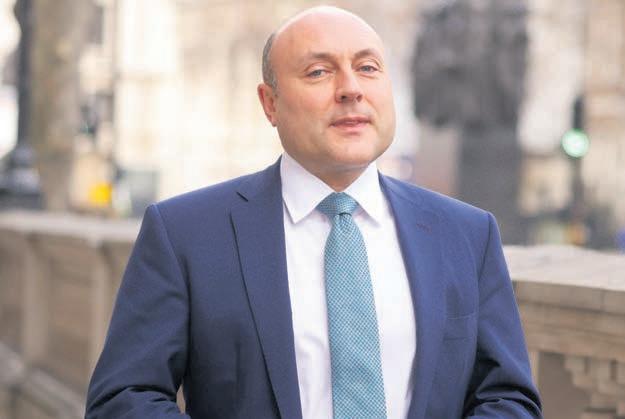
The sector employs 375,000 people across the country and contributes £30.7bn to the British economy itself, according to the report.
Over the past year alone, UK law firms’ revenues increased 12.5 per cent to £41.4bn on the of back a boom in demand for legal services related to the economic impacts of the pandemic.
This growth was mainly driven by the UK’s top 100 law firms, which together generated £31bn worth of revenues in the financial year 2021/22, up nine per cent compared to 2020/21, the report said.
The top 25 law firms alone generated
almost 82 per cent of those revenues, with these top firms producing £25.4bn in 2021/22, a figure nine per cent higher than the previous year.
This growth secured the UK’s longheld position as the largest legal market in Europe and the second largest legal hub in the world, after the United States.
Britain’s leading position comes as a result of the widespread popularity of English common law in resolving international commercial disputes, the City UK report says.
This position saw the UK account for a third of Western Europe’s fee revenues last year, and more than five per cent of fee revenues worldwide.
Britain’s status as a global legal hub has also seen more than 200 international law firms set up offices in London, including all 40 of the world’s top 40 firms.
Five of the world’s 20 largest law firms are currently headquartered in Britain, including four of the UK’s five elite ‘Magic Circle’ firms.
Inside the UK, the legal sector employs hundreds of thousands of people in London, 13,000 in Manchester, 10,000 in Leeds, 9,000 in Birmingham, and 8,000 in Bristol and Glasgow each.
be limited.
The reports come as ministers prepare to set out a raft of reforms to financial rules this week, including potential changes to Mifid II rules, which forced firms to ‘unbundle’ broking and research fees and have been blamed for a dearth of investment research into UK firms.
Chancellor Jeremy Hunt already announced ministers would scrap Solvency II rules governing insurance firms in a bid to free up billions of pounds of investment.
FTX founder Bankman-Fried calls in Ghislaine Maxwell’s attorney
CHARLIE CONCHIE
FTX FOUNDER Sam Bankman-Fried has called in Ghislaine Maxwell’s defence lawyer to defend him as regulators and prosecutors circle amid allegations of fraud.
Defense attorney Mark Cohen, who defended convicted sex trafficker Maxwell, has been appointed by the FTX founder as federal prosecutors in Manhattan prepare actions against the disgraced crypto chief over the misuse of customer funds, Reuters reported yesterday.

Bankman-Fried is also reportedly facing probes from the Securities Exchange Commission and the Commodities Futures Trading Commission.
Bankman-Fried, who recently said he has around $100,000 in his account, admitted he does not have a strategy over how to pay legal fees in the long run.
“I don’t necessarily have a longterm plan there yet,” Bankman-Fried said. “I am not sure I will be able to pay all of the legal fees I need to pay.”
KPMG fined over exam cheating scandal in UK
LOUIS GOSS
THE USA’s accounting watchdog has fined KPMG $7.7m (£6.3m) and sanctioned four of its auditors over a series of international offences, including its failure to properly deal with a widespread UK cheating scandal.
The watchdog claimed hundreds of KPMG’s UK staff cheated on exams, including the tests auditors are required to pass to maintain their professional certifications.
The US Public Company Accounting Oversight Board (PCAOB) fined KPMG $2m over claims the firm’s UK business failed to detect or prevent the widespread sharing of answers from 2018 to 2021.
KPMG’s UK chief executive Jon Holt said the Big Four firm has “since put additional monitoring measures in place” to prevent answer sharing from happening again.
The Big Four firm’s UK business was hit with another $600,000 fine over claims it failed to properly supervise its unregulated Romanian affiliate in its work on four separate audits.
The regulator said the unregistered Romanian arm carried out 74 per cent of all work on the audits, as it claimed KPMG falsely stated that an entirely separate PCAOB-registered business had instead carried out the audit work.
Barristers’ watchdog to bolster staff following surge in misconduct cases
 LOUIS GOSS
LOUIS GOSS
THE BARRISTERS’ regulator is seeking to bolster its enforcement teams to deal with a surge in misconduct cases involving social media.
The Bar Standards Board (BSB) is aiming to recruit a “small number” of new staff to work on its 18-strong enforcement team following an
uptick in complaints against barristers, a BSB spokesperson told City A.M.
The hiring drive comes after the BSB’s annual report last week revealed the watchdog received 2,517 reports about barristers’ misconduct last year – marking a 54 per cent increase on 2020/21.
The uptick followed an 82 per cent
increase in cases involving social media, which saw the number of cases surge from 49 in 2020/21 to 89 the following year.
The BSB in July also released updated guidance on barristers’ use of social media, warning members of the bar have a duty not to diminish trust and confidence in the profession.
CITYAM.COM 14 THURSDAY 8 DECEMBER 2022 NEWS
LOUIS GOSS
Former billionaire Bankman-Fried said he was unsure if he could pay all his legal fees
The barristers’ watchdog released guidance over use of social media earlier this year
City minister Andrew Griffith will unveil a muted package of reforms tomorrow
MARK KLEINMAN
 @MARKKLEINMANSKY
@MARKKLEINMANSKY
BREAKING BUSINESS STORIES AND ANALYSIS
City bosses are on the Hunt for a real Big Bang
ABIG BANG or just a mid-sized roundtable? In Edinburgh tomorrow, the Chancellor, Jeremy Hunt, will convene a gathering of top financial services industry executives to unveil a package of industry reforms already engulfed by hyperbole.
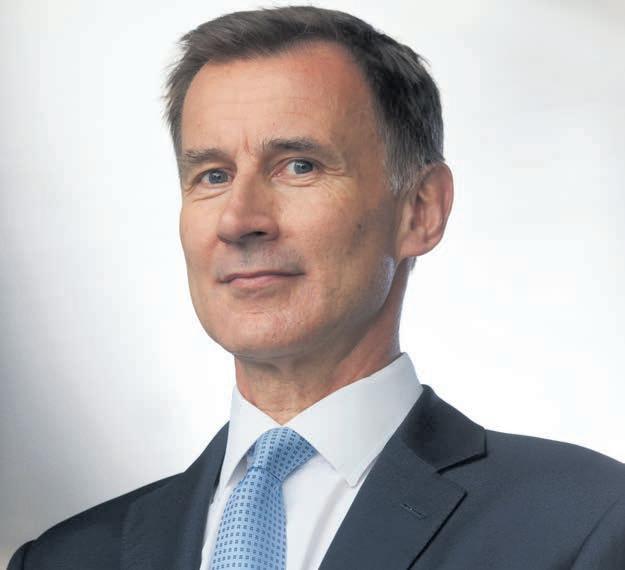
Alison Rose, the chief executive of NatWest Group, and Stephen Bird, boss of fund manager Abrdn, will be among those in attendance and primed to nod sagely at all the right moments of the Chancellor’s remarks.
But will it all amount to very much? The package has been dubbed Big Bang 2.0 for months, but it may be a nod to the likely impact of their introduction that Whitehall insiders have this week taken to describing them as “the Edinburgh reforms”. That rather softer soubriquet may turn out to be more apt. That’s not to say they will end up as the dampest of squibs. A review of MIFID-II unbundling rules, which I reported on earlier this week, will be one of the centrepieces of the chancellor’s announcement. City insiders say that whoever is picked to spearhead the review will be expected to recommend wholesale changes designed to trumpet the UK’s post-Brexit freedoms. This fits a clear political narrative, although it’s not evident that such changes are at the top of the industry’s current wishlist.
Somewhat awkwardly for the government, a review by the Financial
Conduct Authority published in 2019 found that MIFID-II was largely working in investors’ interests. Squaring that conclusion away with a push to deregulate the area will present a tricky tightrope for
IT’s safe to say that Sir Keir Starmer and Rachel Reeves played a blinder tapping up Lord O’Neill, the former Goldman Sachs chief economist and Treasury minister, to spearhead Labour’s review of the UK’s start-up economy. His panel’s report, published today, includes recommendations focused on aping the French Tibi scheme to unlock
the Treasury. Also clearly signalled is a plan to deliver the moderate overhaul of the bank ringfencing outlined in the review led last year by Keith Skeoch, the former Standard Life
institutional capital for early-stage companies.
It also has the British Business Bank squarely in its sights, arguing for an overhaul of the institution’s remit and operational independence. That would include extending the period over which the BBB’s strategy is reviewed by the government, which is currently
Aberdeen chief.
Hunt will say they plan to raise the deposits threshold for banks to ring-fence their retail arms from £25bn to £35bn, according to insiders. That will delight the likes of Goldman Sachs and JP Morgan, whose Marcus and Chase divisions in the UK will now take much longer to be impacted as they grow their deposit bases.
The other area of Skeoch’s mandate, a review of securitisation regulation, will also be implemented, according to an insider. What does this package amount to? Industry executives –admittedly unsighted on the full contents –I’ve spoken to this week are reserving judgement until tomorrow, but believe Andrew Griffith, the new City minister, has at least assembled a sensible assortment of measures which perform overdue tweaks to the industry’s international competitiveness.
Griffith has also written to the banking and City regulators reminding them of their (secondary) competitiveness objectives and called for greater transparency from them in letters published this week.
So will the Edinburgh reforms be condemned to being damned with faint praise? Most chancellors approach setpiece announcements with at least one rabbit ready to pull out of a hat. Unless Hunt adopts a similar approach tomorrow, Big Bang 2.0 will have proven itself unworthy of such a grandiose moniker.
undertaken on an annual basis. Reviewing the scope of tax-efficient investment schemes such as EIS and SEIS is also among a large number of logical and thoughtful O’Neill recommendations.
Rishi Sunak’s administration should not hesitate to be shameless and implement many of them without delay.
Freetrade deals on the rocks –so what’s next?
WHAT future for Freetrade, the stocktrading app whose founder was hopeful not so long ago of raising external funding at a £700m valuation?

After I disclosed last week that the company was in tentative discussions to sell itself to JP Morgan, I hear that Monzo, the neobank, also looked closely at buying the business earlier this year.
This is where the trail gets cooler. Industry sources say the talks with Monzo didn’t
proceed over valuation concerns, although any attempt to raise other rumours circulating the sector about discussions between Freetrade and regulators is met with a somewhat aggressive response from the company.
Sources say the discussions with JP Morgan are ultimately
unlikely to result in a deal, which may explain why Freetrade is reportedly lining up Bank of America to help it explore its strategic options.
The UK fintech’s most recent funding round, a £30m capital injection, saw existing institutional investors, including Molten Ventures and L Catterton, participating, as well as
The Phoenix, an investment manager, and private investment firm Capricorn Capital Group joining as new investors.
Freetrade says it does not comment on fundraising activity but denied last week that it was “in a diligence phase with a party”. Its defensive approach doesn’t imply that the company is optimistic about attracting a bumper valuation. But then, which fintech founders are these days?
Fraudsters using ‘brute force’ tactics due to lack of fear of getting caught
by Interpol and identity verification company Onfido says.
FRAUDSTERS are increasingly resorting to “brute force” tactics, having been emboldened by a lack of consequences for those who are caught, a new report says.
A lack of enforcement has seen fraudsters adopt increasingly unsophisticated methods, the report
The situation has seen criminals turn to using blanket approaches in their efforts to find and take advantage of weak links in companies’ cyber defences, the report said.

The paper follows warnings from the National Audit Office that the UK
government lacks a coherent strategy for tackling fraud and has significant gaps in its understanding of the problem.
Simon Horswell, a fraud specialist at Onfido, told City A.M. fraudsters are using bots to “churn” out thousands of fake documents to circumvent defences. “Repercussions aren’t really visible,” he said.
15 THURSDAY 8 DECEMBER 2022 NEWS CITYAM.COM
Fraudsters’ methods are becoming increasingly unsophisticated, the report said
LOUIS GOSS
Labour’s good ideas on start-up firms should provide food for thought for Rishi and pals
London office to close as Koinly feels ‘crypto winter’
BOSSES at crypto tax reporting platform Koinly say they are already letting staff go and will be shutting down their London office in the new year.
The company’s founder is pointing the finger at the so called ‘crypto winter’ and prolonged bear market with the start-up tax reporting application facing a 14 per cent layoff which will affect 16 members of staff.
The end-of-year move is a deeply contrasting change in fortunes to the start of 2022 which saw Koinly enjoy an enthusiastic 225 per cent expansion.
Offices in Sydney will remain open and become the firm’s headquarters, while the London office will close in 2023. No statement has been made about Koinly’s Canadian base in Toronto.
“We are taking measures to ensure we’re as lean as possible as we make our way through the crypto winter,” said Robin Signh, Koinly’s founder and Chief Executive Office.
“While change is an unavoidable part of business, it’s been a sad week at Koinly as we have had to let go of several of our colleagues.”
In a company-wide statement, Koinly’s management team said the job losses to its global team were a bid to combat the challenging conditions facing the cryptocurrency market and economy at large.

Mr Singh explained the cuts were a response to the intensifying bear market, compounded by the collapse of major cryptocurrency ex-
change FTX in mid-November 2022.
“As a crypto tax company, what’s hurting us more than the actual crypto downturn is the lack of awareness crypto investors have around filing their crypto losses,” he added.
“We are seeing fewer people reporting crypto on their tax returns, mostly because there are a lot of losses this year. However, investors are generally unaware that filing
losses on their tax returns benefits them in the long run, as losses can be used to offset gains in future years.”
Founded in 2018, Koinly is used by thousands of cryptocurrency investors, accountants and blockchain businesses and is the tax partner for a number of cryptocurrency exchanges.
Koinly may be the latest company in the digital assets industry to cut
staffing levels in a bid to survive the ‘crypto winter’, but it certainly isn’t the first.
Already this year, exchange behemoth Coinbase cut 18 per cent of its global staff – around 1,100 employees – during summer before making 60 more roles redundant last month. Crypto.com, Celsius, ByBit and BlockFi have also jettisoned significant numbers.
Some glimmers of optimism remain in markets
THE CRYPTOCURRENCYmarket
inched higher this week, with the price of Bitcoin (BTC) spiking above $17k over the weekend. It has since fallen back somewhat and is broadly flat, changing hands for around $16,860 last night.
The price of Ethereum (ETH) is down two per cent since this time last week, trading at just above $1,200.
The flat performance will be of some comfort to crypto investors after a turbulent November in the aftermath of the FTX collapse. The brief breakout
over the weekend follows a speech last week by US central bank chairman Jerome Powell, in which he noted that the FED “could live with a more modest interest rate hike in December”.
There has been a strong correlation so far this year between interest rate rises and price movements across all financial markets. Will we continue to see the two moving in step into next year, and could a slowdown in rate rises aid crypto’s recovery?
Demand for crypto certainly doesn’t seem to be coming back just yet though,
with severely reduced trading volumes in spot and derivatives markets suggesting market participants continue to shy away from the crypto market. Daily trading volumes in BTC spot markets, when excluding Binance, sits 65 per cent below the yearly average. On November 29, the 7-day average real spot volume in BTC (excluding Binance) reached $510m – lows not seen since October 2020.
However, there are still reasons for optimism, with a stream of bullish sentiment from institutional investors
this week. Goldman Sachs for one indicated that it plans to spend tens of millions of dollars to buy or invest in crypto companies after the recent market turmoil. Mathew McDermott, Goldman's head of digital assets, told Reuters that "we do see some really interesting opportunities, priced much more sensibly".
COWEN DIGITAL TURNS TO LONDON FOR LEADERSHIP
COWEN Digital has appointed London-based Taylor Cable as managing director of the firm’s European and Asian activities.
Cable formerly held institutional positions at Blockchain.com including COO of BCAM (Blockchain.com Asset Management) and Head of Institutional Client Trading. Prior to Blockchain.com, he was COO and Executive Director at AiX and spent more than 16 years at Moore Capital Management in a variety of positions including Portfolio Manager and Senior Trader.
“As Cowen Digital continues to grow, we are thrilled to have an executive of Taylor Cable’s calibre to head up our expansion into Europe and Asia,” said Drew Forman, Head of Cowen Digital.
EGLD NOW ON COINBASE
MULTIVERSX’S native EGLD token has been listed on one of the world’s biggest cryptocurrency exchanges.
Formerly known as Elrond Network, MultiversX went live for deposits and withdrawals with Coinbase on Tuesday before trading on the EGLD/USD pair began yesterday evening.
Founded in 2017, Elrond rebranded last month as MultiversX when the Paris-based organisation announced a massive shift of focus towards the growing metaverse market. The new vision was introduced during the company’s first annual conference, hosted at Palais Brongniart in Paris where new products xPortal, xMoney and xWorlds were unveiled.
ZUMO LAND DATA GURU
EDINBURGH-based crypto platform Zumo has brought in award-winning industry innovator Vicky Byrom as its first Chief Data and Analytics Officer.

Byrom will drive the development of Zumo’s data strategy to meet the evolving needs of the business, managing and governing data whilst also ensuring the value of that data is fully realised as a strategic asset. Her focus will be on making data analytics accessible, transparent, secure and useful to the organisation.
She will be responsible for establishing a data governance committee to map data across the business, making sure new data sources are prioritised, ingested and promoted in adherence to regulatory frameworks.
EOS ON THE UP
LONG-forgotten digital asset EOS has sprung back into life to provide some of the only sport available to crypto traders this week.
The five-year-old ‘Ethereum alternative’ blockchain infrastructure token was one of the few cryptocurrencies to hold and maintain green candles over the last seven days, weighing in with an eight per cent weekly lift to $1.02.
Yesterday’s trading volume for EOS clocked $170m – an impressive 24-hour rise of more than 90 per cent.
EOS reached an all-time high of $22.89 in April 2018.
FOR ALL THE LATEST NEWS, VIEWS AND ANALYSIS HEAD OVER TO CRYPTOAM.IO Connecting the Community CITYAM.COM 16 THURSDAY 8 DECEMBER 2022 FEATURE
CRYPTO NEWS IN BRIEF
CITY DASHBOARD
YOUR ONE-STOP SHOP FOR BROKER VIEWS AND MARKET REPORTS









LONDON REPORT BEST OF THE BROKERS
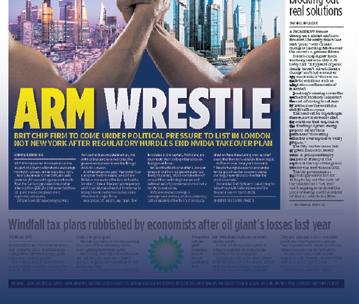







Oil price tumble drills into Shell and BP share price as FTSE 100 dips
LONDON’s FTSE 100 was dragged down yesterday by BP and Shell sinking on oil prices taking a tumble. The capital’s premier index fell 0.43 per cent to 7,489.19 points, while the domesticallyfocused mid-cap FTSE 250 index, which is more aligned with the health of the UK economy, dropped 0.89 per cent to 18,930.57 points.
Oil prices tumbled around two per cent yesterday, mainly driven by investors betting demand for the fossil fuel will shrink during the coming global economic slowdown.
That bleak outlook saw BP shed 2.24 per cent yesterday while Shell lost 1.82 per cent.
Analysts also said the uncertainty over whether the UK government will expand a windfall tax on energy companies weighed on the sector.
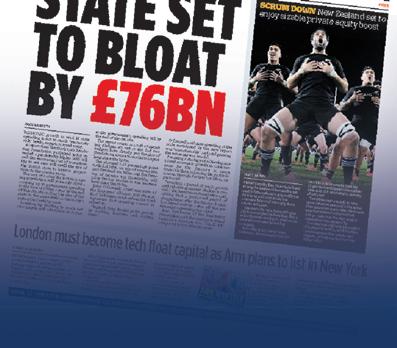
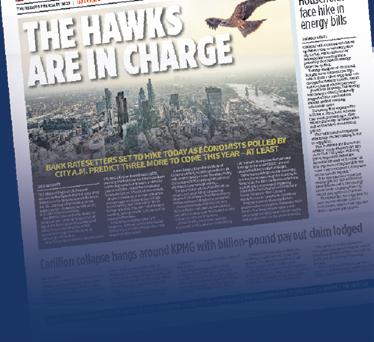

“With oil prices hitting their lowest








levels this year, Shell and BP shares have been the main laggards on the FTSE 100, however the decline in energy prices also raises a wider question with respect to smaller energy producers in respect of the windfall tax,” Michael Hewson, chief market analyst at CMC Markets UK, said.
Card maker and FTSE 250 listed Moonpig slumped nine per cent yesterday after it slashed revenue expectations on fears the cost of living crunch will engineer a spending slowdown.
But, analysts at broker Peel Hunt said the price movement was an overreaction.



Drug giant GSK soared to the top of the FTSE 100, adding 7.54 per cent after a US judge threw out claims that the Zantac drug caused cancer.
The pound strengthened 0.58 per cent against the US dollar.
Wall Street opened flat.
Peel Hunt downgraded its target price for Dr Martens by 75p yesterday to 400p following the shoemakers forecast downgrade. The broker kept the firm’s add rating, noting its opportunity to boost awareness in Europe and US. Sales penetration is 32 pairs per 1,000 people in the UK, which drops to 17 pairs across the Atlantic –which Peel Hunt says represents an opportunity compared to the wider market.

MUSICMAGPIE
Musicmagpie nabbed a buy rating from Peel Hunt yesterday after it posted a record Black Friday week. The broker said it was a “testament to its intrinsic business model” and the rental offering provides a much lower entry point for the squeezed consumer. It gave the online retailer that sells refurbished electronics and video games a target price of 68p.

17 THURSDAY 8 DECEMBER 2022 MARKETS CITYAM.COM
P 7 Dec 195.4 6 Dec 5 Dec 2 Dec 1 Dec DR MARTENS 195 7 Dec 200 205 210
To appear in Best of the Brokers, email your research to notes@cityam.com P 6 Dec 5 Dec
Dec 1 Dec
2
7 Dec 21.35 18 7 Dec 26 28 24 22 20
NEW YEAR OF DISCONTENT?
“Unsurprisingly, the news of border force walkouts sent share prices in companies like TUI, IAG, Jet2 and Easyjet on a downward trajectory as investors consider how much of a dent the disruption will make to December’s revenue and ponder the possibility that what has started as a winter of discontent could linger well into the New Year.”
DANNI HEWSON, AJ BELL
GET YOUR DAILY COPY OF DELIVERED DIRECT TO YOUR DOOR EVERY MORNING SCAN THE QR CODE WITH YOUR MOBILE DEVICE FOR MORE INFORMATION IT’S FINALLY HERE RIVALRIES RENEWED AS THE SIX NATIONS RETURNS FOR 2022 8-PAGE PULLOUT 2022 SIX NATIONS ENERGY D-DAY Households LONDON’S BUSINESS NEWSPAPER FREE CITYAM.COM THURSDAY 10 FEBRUARY 2022 CITYAM.COM COOL RUNNINGS ALL THE GEAR FOR AN OVERDUE MOUNTAIN BREAK P20 STATE SET MAN IN THE KNOW MARK KLEINMAN GETS THE CITY TALKING P13 LONDON’S BUSINESS NEWSPAPER LONDON’S BUSINESS NEWSPAPER CITYAM.COM Climate noise blocking out THROUGH THE DRINKING GLASS THE LATEST FROM OUR WINE GURU P22 ISASUNWR WHERE PUT MONEYTHIS YEAR WEDNESDAY FEBRUARY 2022 ISSUE 3,677 THE ULTIMATE SAVINGS GUIDE ALL YOU NEED TO KNOW ABOUT YOUR ISA P19-21
EDITED BY SASCHA O’SULLIVAN
Try as Sturgeon might, Scotland can’t overcome the problem of geography
 Will Cooling
Will Cooling
THERE is a saying in Mexico, “So far from God and so close to the United States”, to explain how its proximity to a richer and larger neighbour has stunted its development and bedevilled its politics. They would likely have short shrift then for the plight of Scotland, which once dreamed of conquering Panama, and is now led by a party fighting to cut itself off from the source of its wealth, and one of the world’s largest economies.
The lurid claims, put forward by separatists, of Scotland being a colony are untrue, but there is a secret that hides in plain sight: the United Kingdom of Great Britain and Northern Ireland is not a means to perpetuate England’s domination over the other three nations, but to mitigate it. England’s perceived outsized influence over the United Kingdom is simply a fact of its 85 per cent population capture. It makes Imperial Germany (60 per cent Prussian) or the Soviet Union (50 per cent Russian) seem well-balanced.
More than that, unlike the Junkers of Germany or the Politburo of the USSR, we English are closer to continental Europe and the open seas than the smaller nations we neighbour. For a moment, make the superficial comparison with Scotland and Catalonia.
The angst-ridden Spanish region has millions more people, a land border with France and quick access to the wider Mediterranean. It does not rely on going through the very country it is agitating to secede from to maintain its economic and cultural ties with the wider world. Scotland would still have to go through the UK to enter its nearest European neighbours, either through Northern Ireland or England. This weakness in the separatist cause has long been known. Alex Salmond, before he finally succumbed to that most honoured of Scottish National Party traditions by going peculiar upon ceasing to be leader, liked to talk about Scotland being part of a “Northern European arc of prosperity”. In other words, the Nordic countries
were a route to trade and wealth that didn’t run through England.
But Oslo is far further away from Edinburgh than Paris is. Yes, there’s no England in between Scotland and the Nordic countries, but there’s an awful lot of choppy seawater. If Scotland was truly well-positioned to be a hub for a significant volume of Anglo-Nordic trade, then it would have already achieved such status, given that until 2021 we were all part of the European Single Market.
That it didn’t underlines how the main route from continental Europe into the British Isles runs through England wherever you are. And just as at the independence referendum, a clear majority of Scottish people know that the SNP can offer nothing to change
It is for that reason the Union transformed Scotland from a backwater into an intellectual powerhouse. Scotland has never been better governed than since 1707 when it came under the control of the Westminster Parliament. Scottish people have used their nation’s merger with its larger neighbour to achieve things that they would never have done otherwise, due to greater investment at home and more opportunities to work and study
We can’t survive without North Sea drilling, but we also can’t continue in the same way

THE North Sea has occupied a significant place - not just geographically - but in the debate of future energy supply in the UK.
It’s deeply polarising, to say the least. Protesters want us to stop drilling in the North Sea altogether, while other radical commentators insist we must extract whatever we can no matter the cost to the planet.
Both sides ignore the benefits of new technologies that can help ease our transition to achieving net zero, while ensuring we retain sufficient domestic energy security.
What is clear is that there has been a misstep in our energy strategy. We are too vulnerable to external factors and too reliant on questionably-sourced foreign supply. The government cannot afford to keep bailing energy companies out. Consumers cannot afford to keep paying exorbitant bills.
In crisis lies opportunity, and this is the perfect moment to press for change. The North Sea has a role to play, but we must ensure it is a newer,
Steve Brown

better and more innovative North Sea. The government appears to agree - at least to an extent. The industry regulator, the North Sea Transition Authority, is now ready to issue over 100 new licences. But other challenges remain: sourcing investment for new North Sea projects has become more difficult in the last decade, and ensuring the right platforms are awarded licences by the regulator is incredibly important.
We cannot ignore the importance of our commitments to the environment, but those who want to axe every project misunderstand how new technologies work. Al Cook, the CEO of Equinor, used a good analogy recently, stating
that older platforms are the equivalent of driving an old banger coughing out pollution, when you could be driving a new car that produces far lower emissions.
On average, extracting one barrel of oil from the North Sea produces 20kg of carbon dioxide. Innovative technologies can reduce these emissions by more than 80 per cent. Striving to reduce our CO2 output has to be part of the reinvigoration of the North Sea.
Doing so will also make the sector more appealing to investors, who are far more environmentally conscious after years of the government enthusiastically backing renewables.
Two examples of these nascent technologies are polymer flooding and floating offshore wind power. These techniques make the extraction process more efficient and reduce emissions through power generation.
Using both can add roughly three billion barrels of oil to the UK’s reserves, and due to the speed of the process, results in drastic reductions of emissions per barrel.
Given that wind power has been identified as key to transforming the UK into an energy exporter by 2040, there is a dual benefit to reducing North Sea emissions while honing renewable technologies that are the future of our energy supply.
By working more closely with renewable energy technologies like floating wind, we can also create a pathway for re-skilling oil and gas sector workers as the move towards renewables rightly gathers momentum.
There is exceptional financial and business expertise in the North Sea, given how mature the sector is compared to other newer types of energy, and that knowledge can be valuable to other energy sectors too.
We should be sharing expertise and working together to protect the UK from future disruption, and only by being bold in our approach will we be able to reinvigorate our domestic energy sector.
£ Steve Brown is chief executive officer of Orcadian Energy
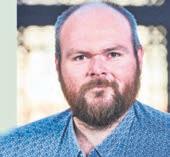

in England.
This is why Gordon Brown is wrong to offer giving more power to Holyrood as a panacea to separatism. In his incessant advocacy of greater devolution, he best resembles a mediaeval doctor who sees any symptom as a call for more leeches. Such medicine was wrong in 1998 and wrong in 2014, and it’s wrong again this week.
Rather than making false promises about England getting out of Scotland’s way, as if English interference was avoidable let alone always bad, how about looking at new ways England’s greater economic muscle can be better utilised to build greater capacity in its northern neighbour. Whether it be football, culture, agriculture, transport, tourism, or higher education there’s so many sectors where the problem is not that London is doing too much to hold Scotland back but that it is doing too little to lift it up.
George Galloway once dismissed the SNP’s promises of a painless separation by saying he had been divorced three times, and each time it had caused acrimony. To follow the same analogy, you don’t save your marriage by whittling down what you do together until there’s nothing left to the partnership.
Scotland and England will always have to live together, but Keir Starmer can make that partnership more harmonious and stable by ignoring Gordon Brown’s latest doomed attempt to stop the English influencing Scotland, and instead focus on enhancing the support, comfort and opportunities England gives to the Scottish.
£ Will Cooling writes about politics and pop culture for the It Could Be Said substack

CITYAM.COM 18 THURSDAY 8 DECEMBER 2022 OPINION
OPINION
that brutal fact of geography. That a majority of the English, Welsh, and Ulster Unionists have since voted for Brexit is a red herring; whether the rest of the UK is in or out of the Single Market doesn’t change the fact that Scotland is the most distant part of these islands from Europe.
Nicola Sturgeon has vowed to make the next election a ballot on independence
YOU’RE THE PROBLEM, IT’S YOU Taylor Swift, the face and voice of heartbroken dreams, was almost also a big name sponsor with FTX, before the exchange collapsed in November. Swift fans would have had to contend with Sam BankmanFried and Ticketmaster, which bungled the star’s gig sales
A new look at supply chains
[Re: UK business fear supply chain chaos will ruin Christmas trading, December 5]
In the last week, City AM has run several stories on the continuing chaos engulfing global supply chains and the industries this is affecting.
The articles rightly identify problems such as key materials shortages, a shrinking labour market, and rising energy costs, all compounded by soaring inflation. Still, this framing takes the possibility for improvement out of the hands of supply chain stakeholders. Organisations need to look at what they can control, not wring their hands over what they can’t. When external pressures are squeezing supply chains, the key is to look more closely at individual processes, the micro rather than the macro of supply chains. Workers need the highest
quality and most innovative (without being disruptive) tools they can get their hands on. In addition, organisations need to ensure these tools improve worker well-being in a shrinking labour market.
In the piece on the automotive sector, “innovation, productivity and (a) highly skilled workforce” were mentioned as strengths of the UK automotive industry, and arguably they are cornerstones of any thriving industry. However, more should be done to emphasise them.
By investing in human-centred technologies that improve worker processes, organisations can make valuable productivity gains, at a micro level, that are amplified across entire organisations. Solutions like wearable technology, with accurate data insights, can achieve this. Individual process improvements can have the most significant impact in an increasingly complex and fraught global logistics landscape.
Ilhan Kolko ProGlove
Putin’s war with Ukraine is unwinnable but as a leader, he cannot afford to lose
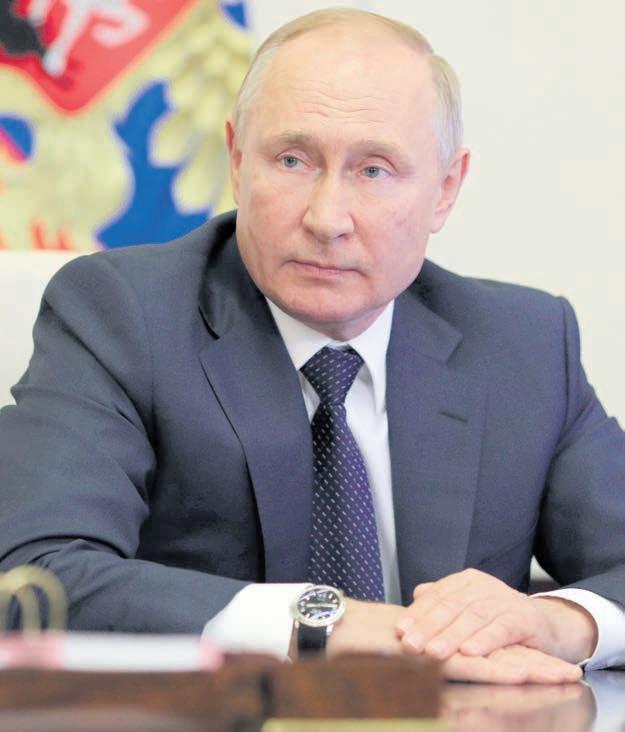
TEN months into Russia’s invasion of Ukraine one simple fact has become abundantly clear: set against its original goal to completely conquer Ukraine, Moscow cannot win the war but neither can Putin afford to lose it.
More solar farms on the horizon for UK agriculture land

TIME IN THE SUN
Rishi Sunak is under fire over whether or not he will allow more onshore wind, despite promising to keep the ban over summer. In the meantime, Therese Coffey has promised a softening of rules restricting new solar farms.
EXPLAINER-IN-BRIEF: CONSERVATIVES’ MONEY PROBLEMS
The Conservative Party is hiking its membership fees. Annual membership will go up from the current £25 to £39. The move might prove yet another point of friction in the party, with Conservative MP Justin Tomlinson calling it an “absolutely stupid idea” on Twitter. Yet the party’s headquarters must have felt they didn’t have many other choices to pile up cash.
Donations went from £5.3m in the second quarter of the year,

down to £2.9m between July and September. As part of the fundraising strategy, tickets for Conference were also up this year slightly. The early bird went from £55 in 2021 to £60 pounds in 2022, while the advance ticket saw a 10 pounds increase to £120. The standard ticket stayed at £220. The Labour Party, on the other hand, has seen a solid flux of money as donors start to truly believe it could win the next election.
ELENA SINISCALCO
Ukraine has fought heroically to repulse the original Russian invasion and to push back Putin’s forces. But, for all the positive words, the inescapable fact remains that Ukraine is not currently equipped to retake all its territory. Completely repulsing Russia would be the optimum outcome of the war, but the current capability of the Ukrainian military and pace of advance make this currently unlikely.
The international community, in the absence of further support on the battlefield, should keep open other possibilities for how it can end. It is the Ukrainian people, above all, who continue to suffer most from the ongoing hostilities, with widespread blackouts arising from continued Russian missile attacks.
Since the initial invasion Russia has had an estimated 100,000 troops killed or injured and has had to take the deeply unpopular decision to mobilise more reservists at home. Facing wellequipped and highly motivated Ukrainian forces, Russia retains control of territory not significantly larger than when they first invaded. Set against their original objective of bringing Ukraine into its orbit, Russia has no realistic prospect of victory. But Putin has tied himself inexorably to the conflict. If Russia is defeated it is hard to foresee how Putin can continue as leader, with growing opposition on both his pro and anti war flanks. So he can neither win, nor can he afford to lose. With significant ter-
ritorial gains off the cards, Russia will likely continue to escalate hostilities through other means such as missile strikes to cripple Ukraine’s infrastructure.
Ukraine faces a long, difficult winter. Zelensky will face significant pressure in the coming months to keep the country functioning in the face of incessant Russian missile strikes, equip Ukraine’s military for the next significant phase of the ground campaign in the spring and begin the long process rebuilding the country. This is no easy feat. Globally, the continued conflict continues to have grave impacts. Growth forecasts have been cut, while prices, particularly food and energy, are rising.
For Ukraine’s international allies, the starting point must be agreeing on a unified strategy for sustained military and humanitarian support. We should do all we can to help Ukraine building on the “just-in-time, just enough” approach Admiral Rob Bauer, Chairman of NATO’s military committee, used to characterise the defence industry’s approach to the war.
Greater Pan-European and American
coordination is needed to address serious issues of stockpiling and equipment supply, which would help shift Ukraine onto a stronger footing come spring.
If, on the other hand, it becomes clear that the next phases of the war are likely to be protracted and costly, a negotiated end to the war should stay on the table, and form part of our preparations. Such a course must start and be led by Ukraine but it will require international support.
While Russia remains trapped in a war it cannot win but cannot afford to lose, Ukraine faces an uphill battle. This winter needs to be a period when we take a hard-headed look at how the war is progressing and what our strategy as an ally should be. Effectively supporting Ukraine in the next phase of the conflict means ensuring our assistance matches their need, not just militarily but economically, and, critically, ensuring Kyiv is in the strongest position possible if it does decide negotiations are needed.
£ Daniel Sleat is Head of Research Unit at the Tony Blair Institute

St Magnus House, 3 Lower Thames Street, London, EC3R 6HD Tel: 020 3201 8900
Email: news@cityam.com

Certified Distribution from 30/5/2022 till 01/07/2022 is 79,855
Distribution helpline If you have any comments about the distribution of City A.M. please ring 0203 201 8900, or email distribution@cityam.com
Our terms and conditions for external contributors can be viewed at cityam.com/terms-conditions
Printed by Iliffe Print Cambridge Ltd., Winship Road, Milton, Cambridge, CB24 6PP
Editorial Editor Andy Silvester | News Editor Ben Lucas Comment & Features Editor Sascha O’Sullivan
19 THURSDAY 8 DECEMBER 2022 OPINION CITYAM.COM
Lifestyle Editor Steve Dinneen | Sports Editor Frank Dalleres Creative Director Billy Breton | Digital Editor Michiel Willems Commercial Sales Director Jeremy Slattery
Daniel Sleat
Set against their original objectives, Russia has no realistic prospect of overall victory
WE WANT TO HEAR YOUR VIEWS › E: opinion@cityam.com COMMENT AT: cityam.com/opinion
LETTERS TO THE EDITOR
Vladimir Putin has tied himself to the war in Ukraine
WAITROSE
Turkey, Stuffing and Bacon & Brie and Cranberry hhiii
SAINSBURY’S
Festive Ploughman’s & Roast Turkey
Just awful. No respite in every bite. It’s not tasteless, there’s too much taste and every inch of it is bad. Blue cheese and cranberry? It may have been a bad batch but I couldn’t finish it. The Turkey Feast is better, but the most valuable player here was the mayonnaise. Its soft, creamy taste offset the wholegrain bread. The turkey was moist and easy to chomp into, while the bacon provided toughness, ensuring the lunchtime snack’s integrity.

BATTLE OF THE CHRISTMAS SARNIES
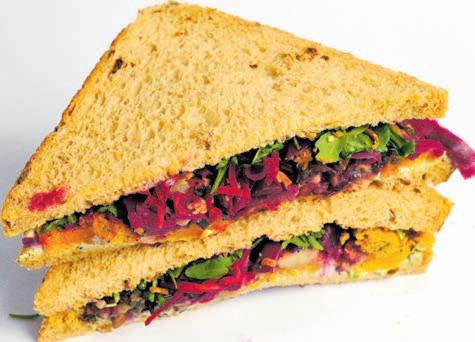
The City A.M. team try this season’s Christmas sandwiches to find out which have been naughty and which are nice


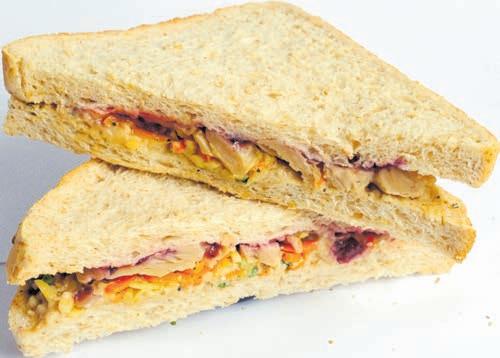
COOP
Turkey Feast & No Turkey Feast hhhii
Surprised as I was to discover it, Coop's Christmas sandwich actually tastes quite a lot like a Christmas dinner between bread. One cranberry was split in half and hanging over the crust, pleading for its life as it was squished against the packet edge, but we can't have it all. As for the veggie option, the soya protein looks a shade too anaemic to get the saliva going, and acts a little too much like a spring to feel like turkey, and doesn't taste much like it either, but hey, the roasted carrot and parsnip base is tasty - but too sweet.

PRET
Christmas Lunch Sandwich & Festive Falafel and Squash hhhhh
Traditionalists say bacon has no place between the slices of a Christmas Sandwich. But, to paraphrase bars around London, “well behaved [sandwiches] don’t make history.” This meaty number from M&S has shrugged off the chains of Christmas past and embraced a bacon present. The salty pork strips play off the sweetness of the cranberry and lift this sandwich well above the stodgy Turkey-and-stuffing fare of its competitors. The veggie version will jingle all the right bells. The shapeless grey protein at its core proves a filling swap-in for its turkey inspiration.

Honestly, why does anyone else bother making Christmas sandwiches? Pret absolutely bring it home every year. These are overfilled to the point of obnoxiousness: the ingredients are jesting at me and other Christmas sandwiches from the packet. Getting the triangle from packet to mouth requires spreading your fingers across the length of the bread to provide human scaffolding to keep the heavy chunks in the bread, but it's a price I'm willing to pay. Pret can jingle my bells anyday.





FOOD& CITYAM.COM
SPORT
FAULT Tennis body slapped with £820,000 fine for banning Russian athletes this summer

WALKER ON MBAPPE: ‘I WON’T ROLL OUT CARPET’
£ England right-back Kyle Walker has said he will not “roll out a red carpet” for France star Kylian Mbappe this weekend when the two sides meet in the quarter-finals of the World Cup. “I understand what I need to do and that is to stop him,” Walker, 32, said. “It’s easier said than done but I don’t underestimate myself. “He [Mbappe] is a fantastic player in great form. It is not going to be an easy task, but as a professional footballer you want to play against the best and I think he is one of the best, if not the best, in the world at the moment.” England take on France on Saturday evening.
FORMULA 1 ANNOUNCE SPRINT RACE LOCATIONS
£ Formula 1 officials have announced the six races that will host ‘sprint’ event’s in next year’s 2023 season. Azerbaijan, Austria, Belgium, Qatar, the USA and Brazil will all host the Saturday event –which pushes qualifying to Friday and earns drivers points and starting grid positions for Sunday’s race. “We have seen a hugely positive reaction to the F1 Sprint events during the first two years of its running,” said F1 president and chief executive officer Stefano Domenicali. “We can’t wait to bring even more action to fans with six events next year.”
OLYMPIC CHAMPION HAS LIFE BAN OVERTURNED
“The
in its finding,
£ American double Olympic champion taekwondo champion Steven Lopez has had his life ban overturned. The Court of Arbitration for Sport overturned the ban on appeal after the fighter was banned from taekwondo in 2016 following sex abuse claims. A CAS panel said that he was banned based on the World Taekwondo 2011 code of conduct but because the incident happened prior to 2011, the code could not be used.
(OVER)PERFORMING LIONS
Sporting Risk – reveals a more complex puzzle for Gareth Southgate.
The most glaring wrinkle in the numbers is that England are massively outperforming their expected goals (xG) at this World Cup. In layman’s terms, they have scored many more times per game (3) than they ought to have (1.58) based on the quality of chances created.
27.9%
IT IS easy to see why bookmakers have anointed France, the reigning champions and home of the best player at this World Cup, Kylian Mbappe, as favourites for Saturday’s quarter-final against England.
But should they? Based on performances in Qatar over the last fortnight, England can make a strong case of their own. They are the only unbeaten team at the tournament, no side has scored more goals, and their defensive record is better than France’s.
That reading could be regarded as a superficial, however, and a deeper dive into the underlying metrics – using data supplied by analytics company
To a lesser but nonetheless significant extent, the same is true at the other end. England have shipped an average of 0.5 goals per game in Qatar versus an xG conceded of 1.0 per game; in other words, Jordan Pickford has been beaten half as many times as might be expected.
There are a few possible explanations for this divergence. It may be that England have been incredibly efficient, and other data suggests that is certainly true in attack, where their shot con-
version rate of 27.9 per cent is the best of the 32 teams.
On the other hand, luck or poor performance by opponents can play a part, and that is a more likely explanation for their defensive success. Either way, outperforming xG to a large degree tends to be unsustainable so it may catch up with England.
Perhaps more concerningly, England’s underlying metrics are actually worse than France’s in both attack and defence. Although they have scored fewer and let in more goals, Les Bleus have better xG at both ends of the pitch at this World Cup.
France are particularly dangerous when crossing and counter-attacking, the data shows. They rank first of the 32 teams for headed goals, accurate crosses and accurate cutbacks, and second for goals from counters, ball carries and dribble distance.
Those who fear Mbappe will punish England’s deficiencies will not find much reassurance in the numbers.
Southgate’s men rank 30th of 32 for interceptions and saves, and dead last for

successful defensive actions per game. If England are to expose a weakness in the French rearguard then it may be through pressing. They rank higher than the holders in that respect, and for frequency of winning the ball in their opponents’ final third.
Opportunity could also knock at setpieces, where France rank fifth worst for goals conceded, and down England’s left flank, given that Didier Deschamps’ side concede more attacks on their right.
On balance then, the data indicates that France’s favouritism is probably justified after all. They have played better, even if they have less to show for it so far. But a World Cup is a small sample size, so some caution is advised and it is equally possible that England ride the crest of their current wave and continue to outperform underlying metrics all the way to the final.
Sporting Risk is an analytics company whose expertise lies in predictive analytics, forecasting and betting on football. www.sportingrisk.com
CITYAM.COM 22 THURSDAY 8 DECEMBER 2022 SPORT
The Lawn Tennis Association (LTA) has been fined £820,000 by the men’s tennis body the ATP over its call to ban Russian and Belarusian male players from grass-court events this summer. The decision was taken after the All England Lawn Tennis Club – who organise Wimbledon – made the same call after Russia’s illegal invasion of Ukraine earlier this year. The fine is the second one for the LTA, who were fined by the WTA – the women’s equivalent of the ATP. This year’s women’s singles event at Wimbledon was won by Elena Rybakina – who was born in Moscow.
ATP,
has shown no recognition of the exceptional circumstances created by Russia's invasion of Ukraine,” an LTA statement said.
SPORT DIGEST
asks Frank Dalleres
Can England keep defying data and beat France at the World Cup,
Kane netted his first goal of the World Cup versus Senegal
England’s shot conversion rate, the highest at the Qatar 2022 World Cup
Why tennis chiefs got into a pickle over padel


I am, my thoughts instantly turn to governance, and the possibility of creating an international federation with attendant opportunities for fat-cattery.


A quick online search only throws up charity space hopper races in aid of injured jockeys (equine ones, not hopping ones) and companies selling hopper racing games for the back garden or stag and hen parties. My mate’s dream of cornering the market for 400m races in packed stadia seems intact. Why not extend it to off-road trail events with hills, mud and water jumps? Or even road races culminating at iconic tourist sites – Buckingham Palace, the Brandenburg Gate or Central Park perhaps?
If the concept catches on, expect squabbles about control to follow: of the rules and regulations, membership, event licensing, anti-doping protocols and the like. All cloaked in an ambition for the sport to be admitted to the Olympics within the next couple of decades. For such is the fate of all new sports, from ultimate frisbee to esports.

Padel and pickleball are two racket sports about as old as space hoppers but which have exploded into the sporting consciousness over the past couple of years on a wave of PR. Celebrity endorsements and investment have been front and centre, from Andy Murray in padel to Hollywood A-listers in pickleball.
It seems there is room for both sports –at least until fitness fashion turns – although not without internecine racket warfare. There has been a bitter legal battle this year between two professional padel tours, with the freedom of players to choose where to ply their trade at its heart.

Moreover, only last month the International Padel Federation saw off an attempt by the International Tennis Federation to take over governance of the sport. With many national tennis bodies already controlling padel on their own soil, this may prove a temporary reprieve.
Why would the ITF want the headache of overseeing a whole new sport? It can only be the threat it perceives from a game that is easier for newbies and the less sporty to master. Plus the natural craving of those in positions of power to be ever more powerful, a seemingly universal condition that afflicts the leaders of world sport.


What about pelota and fives, though? Scope surely for someone to take each of them mainstream and bid for an Olympics



slot. Not even rackets needed for fives, but two versions of the game to confuse. Rugby or Eton? Another job for Boris maybe?
ROCK THE CASBAH
As the World Cup group stages drew to a close, a Sport inc. reader asked: “With the way results are going in Qatar, is it because the big guns are relatively weaker or because the minnows are stronger than prior years? My suspicion is a little bit of both with an element of age being thrown into the mix.”
Now that the quarter final line-up is resolved, Morocco having struck a big blow for the minnows, it seems a good time to look ahead to the 2026 edition in the US, Mexico and Canada which will see the finals expanded from 32 nations to 48, resulting in 80 rather than 64 matches.
The winning team in 2026 will only play the same number of games as currently –seven – so in one way the potential for shocks is unchanged. But European representation rises from 13 to 16 nations, which might mean an extra heavyweight qualifies – think Italy this time around. The same is true of other regions, albeit with different ratios. So more big guns to be shocked.
The principal winners from an expanded competition are Asia, whose minimum number of qualifiers doubles to eight, and Africa with a jump from five to nine or 10.



The current plan, still subject to change, is for groups of only three nations, which would likely be messy with goal difference, goals scored and yellow and red cards looming even larger in the mix. And increased jeopardy of collusion in the final group matches. Fifa is even contemplating penalty shootouts to decide drawn group games.
But, whatever competition format is eventually chosen, after the football we’ve seen so far in Qatar it‘s hard to deny the appeal of a broader tournament. Of course, Fifa president Gianni Infantino’s hold over the affections of football’s smaller and poorer nations – and so his iron grip on power – will be even greater as a result.
Ed Warner is chair of GB Wheelchair Rugby and writes at sportinc.substack.com

23 THURSDAY 8 DECEMBER 2022 SPORT CITYAM.COM







































 MILLIE TURNER
MILLIE TURNER

 ILARIA GRASSO MACOLA
ILARIA GRASSO MACOLA
















 CHARLIE CONCHIE
CHARLIE CONCHIE







 LOUIS GOSS
LOUIS GOSS
 @MARKKLEINMANSKY
@MARKKLEINMANSKY




























 Will Cooling
Will Cooling


































